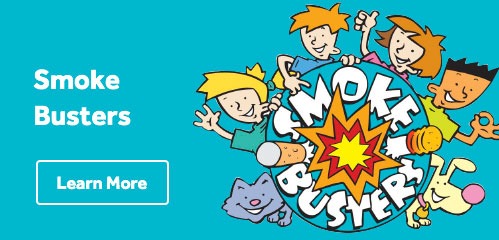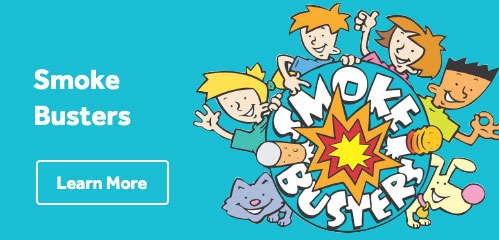 The average age for starting smoking is 12 and children who grow up with a parent or family member who smokes are three times more likely to start smoking themselves. This may be a result of peer pressure or learnt behaviour from adults.
The average age for starting smoking is 12 and children who grow up with a parent or family member who smokes are three times more likely to start smoking themselves. This may be a result of peer pressure or learnt behaviour from adults.
It’s important we make children aware of the dangers of smoking so that they never start.
Breathing in second-hand smoke is particularly harmful for children. They have an increased risk of:
- Cot death (sudden infant death syndrome) – this is twice as likely in babies whose mothers smoke
- Developing asthma – smoke can trigger asthma attacks in children who already have the condition
- Serious respiratory (breathing) conditions such as bronchitis and pneumonia – younger children are much more likely to be admitted to hospital for a serious respiratory infection
- Meningitis
- Coughs and colds
- Middle ear disease (a middle ear infection) that can cause hearing loss
If you’re a parent who smokes, try to lead by example and quit. As well as improving your health and theirs, your children may be less likely to start smoking later in life.
What is passive smoking?
Passive smoking is when people who are not smoking breathe in the second-hand smoke given off from cigarettes. Breathing in someone else’s cigarette smoke can increase your risk of cancer and other health problems including heart disease, heart attack, heart failure and strokes.
How can I quit?
If you’re a smoker and would like to quit, our Stop Smoking Service can help. We can give you support and advice and tell you about Nicotine Replacement Therapies (NRT) that can be tailored to your individual needs. You’re four times more likely to quit smoking if you attend a Stop Smoking Service and use NRT.
For more about our Stop Smoking Service contact 028 9066 3281 or email behealthy@cancerfocusni.org.
To stop children starting to smoke we also run a smoking prevention programme for P6 & P7 pupils called Smokebusters.





